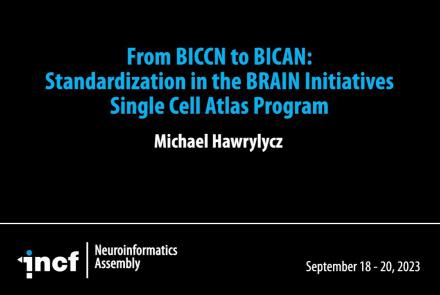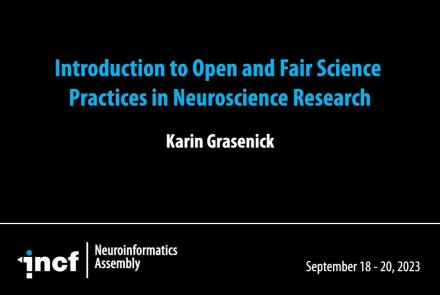This lecture provides an introduction to Plato’s concept of rationality and Aristotle’s concept of empiricism, and the enduring discussion between rationalism and empiricism to this day.
Difficulty level: Beginner
Duration: 1:13:45
Speaker: : Paul F.M.J. Verschure
This lecture goes into further detail about the hard problem of developing a scientific discipline for subjective consciousness.
Difficulty level: Beginner
Duration: 58:03
Speaker: : Paul F.M.J. Verschure
This lecture covers a lot of post-war developments in the science of the mind, focusing first on the cognitive revolution, and concluding with living machines.
Difficulty level: Beginner
Duration: 2:24:35
Speaker: : Paul F.M.J. Verschure
Course:
Maximize Your Research With Cloud Workspaces is a talk aimed at researchers who are looking for innovative ways to set up and execute their life science data analyses in a collaborative, extensible, open-source cloud environment. This panel discussion is brought to you by MetaCell and scientists from leading universities who share their experiences of advanced analysis and collaborative learning through the Cloud.
Difficulty level: Beginner
Duration: 55:43
This lesson provides an introduction the International Neuroinformatics Coordinating Facility (INCF), its mission towards FAIR neuroscience, and future directions.
Difficulty level: Beginner
Duration: 20:29
Speaker: : Maryann Martone
This talk describes the NIH-funded SPARC Data Structure, and how this project navigates ontology development while keeping in mind the FAIR science principles.
Difficulty level: Beginner
Duration: 25:44
Speaker: : Fahim Imam
This video gives a brief introduction to the second session of talks from INCF's Neuroinformatics Assembly 2023.
Difficulty level: Beginner
Duration: 3:55
Speaker: : Trygve Leergard
This talk enumerates the challenges regarding data accessibility and reusability inherent in the current scientific publication system, and discusses novel approaches to these challenges, such as the EBRAINS Live Papers platform.
Difficulty level: Beginner
Duration: 18:08
Speaker: : Andrew Davison
This talk describes the challenges to sustained operability and success of consortia, why many of these groups flounder after just a few years, and what steps can be taken to mitigate such outcomes.
Difficulty level: Beginner
Duration: 18:29
Speaker: : Maryann Martone
In this talk, you will learn about the standardization schema for data formats among two of the US BRAIN Initiative networks: the Cell Census Network (BICCN) and the Cell Atlas Network (BICAN).
Difficulty level: Beginner
Duration: 14:58
Speaker: : Michael Hawrylycz
In this lesson, you will learn about approaches to make the field of neuroscience more open and fair, particularly regarding the integration of equality, diversity, and inclusion (EDI) as guiding principles for team collaboration.
Difficulty level: Beginner
Duration: 14:11
Speaker: : Karin Grasenick
This lesson discusses the topic of credit and contribution in open and FAIR neuroscience, looking through the respective lenses of systems, teams, and people.
Difficulty level: Beginner
Duration: 24:34
Speaker: : Tanya Brown
This lesson consists of a brief discussion around this sessions previous talks.
Difficulty level: Beginner
Duration: 12:43
This brief talk goes into work being done at The Alan Turing Institute to solve real-world challenges and democratize computer vision methods to support interdisciplinary and international researchers.
Difficulty level: Beginner
Duration: 7:10
Speaker: : Alden Connor & Beatriz Costa Gomes
This lesson describes the current state of brain-computer interface (BCI) standards, including the present obstacles hindering the forward movement of BCI standardization as well as future steps aimed at solving this problem.
Difficulty level: Beginner
Duration: 15:01
Speaker: : Martijn de Neeling
This talk describes how to use DataLad for your data management and curation techniques when dealing with animal datasets, which often contain several disparate types of data, including MRI, microscopy, histology, electrocorticography, and behavioral measurements.
Difficulty level: Beginner
Duration: 3:35
Speaker: : Aref Kalantari Sarcheshmeh
This is the third and final lecture of this course on neuroinformatics infrastructure for handling sensitive data.
Difficulty level: Beginner
Duration: 1:11:22
Speaker: : Michael Schirner
In this lecture, you will learn about virtual research environments (VREs) and their technical limitations, (i.e., a computing platform and the software stack behind it) and the security measures which should be considered during implementation.
Difficulty level: Beginner
Duration: 1:06:50
Speaker: : Marc Sacks
This lesson provides an overview of how to conceptualize, design, implement, and maintain neuroscientific pipelines in via the cloud-based computational reproducibility platform Code Ocean.
Difficulty level: Beginner
Duration: 17:01
Speaker: : David Feng
In this workshop talk, you will receive a tour of the Code Ocean ScienceOps Platform, a centralized cloud workspace for all teams.
Difficulty level: Beginner
Duration: 10:24
Speaker: : Frank Zappulla
Topics
- Artificial Intelligence (6)
- Philosophy of Science (5)
- Provenance (2)
- protein-protein interactions (1)
- Extracellular signaling (1)
- Animal models (6)
- Assembly 2021 (29)
- (-) Brain-hardware interfaces (13)
- Clinical neuroscience (17)
- International Brain Initiative (2)
- Repositories and science gateways (11)
- Resources (6)
- (-)
General neuroscience
(45)
- (-) Neuroscience (9)
- Cognitive Science (7)
- Cell signaling (3)
- Brain networks (5)
- Glia (1)
- Electrophysiology (20)
- Learning and memory (3)
- Neuroanatomy (17)
- Neurobiology (7)
- Neurodegeneration (1)
- Neuroimmunology (1)
- Neural networks (4)
- Neurophysiology (22)
- Neuropharmacology (2)
- (-) Synaptic plasticity (2)
- Visual system (12)
- Phenome (1)
- (-)
General neuroinformatics
(26)
- (-) Computational neuroscience (198)
- Statistics (2)
- Computer Science (16)
- Genomics (26)
- Data science
(24)
- Open science (53)
- Project management (7)
- Education (3)
- Publishing (4)
- Neuroethics (37)




















